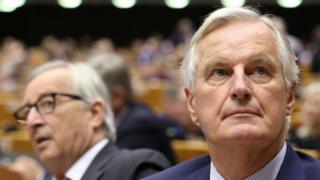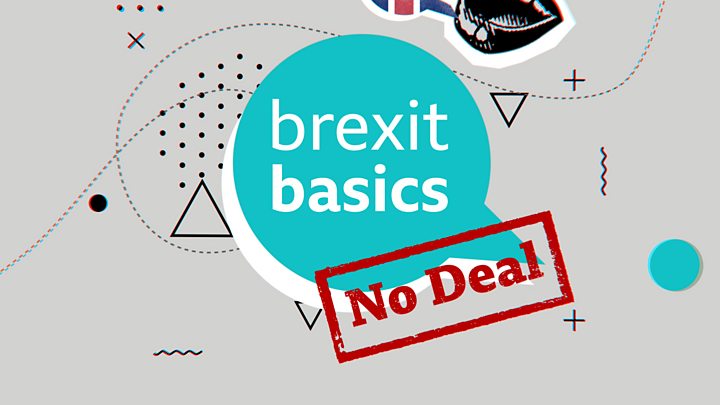Brexit: EU leaders criticise UK proposals
They say they are no closer to an agreement, but “with goodwill” there is still a chance a deal can be…

 Image copyright Reuters
Image copyright Reuters EU leaders have pulled apart the UK’s Brexit proposals, accusing Boris Johnson of putting forward untested ideas to solve the Irish border crisis.
Chief negotiator Michel Barnier said the EU needed workable solutions “today not tomorrow”.
European Commission President Jean-Claude Juncker told MEPs that while he would “not exclude” a deal in the coming days, progress had been limited.
Mr Johnson has said he remains “cautiously optimistic” about a deal.
He is due to meet his Irish counterpart, Leo Varadkar, on Thursday to try and break the deadlock, while continuing to insist the UK will leave on 31 October with or without an agreement.
Earlier, it emerged MPs would be called to Parliament for a special Saturday sitting on 19 October – the day after a crunch EU summit, which is seen as the last chance for the UK and EU to agree a deal ahead of the deadline.
The UK put forward fresh proposals to the EU for a Brexit deal last week, but they have not so far succeeded in breaking the deadlock.
Updating MEPs on the state of talks, Mr Barnier said he believed “with goodwill” on both sides there could be an agreement in the run-up to the summit.
But he said “to put things very frankly and to try to be objective, we are not really in a position where we are able to find an agreement”.
As it stood, he said the UK was proposing replacing an “operable, practical and legal solution” to avoid a hard Irish border with “one that is simply a temporary solution”.

Media playback is unsupported on your device
Mr Barnier said the UK’s suggested alternative to the Irish backstop – which would see customs checks conducted away from the border at business premises or electronically – “had not been tested” and was “largely based” on exemptions for small businesses and technology that “has yet to be developed”.
“We need operational real controls, credible controls, we are talking about the credibility of the single market here – its credulity to consumers, to companies, and to third counties that we have agreements with.”
Mr Barnier also questioned the viability of the UK’s proposals to give the Northern Ireland Assembly a veto over whether it aligned with EU single market rules for goods from 2021 onwards and whether to diverge from them in the future.
However, he did confirm the two sides were looking at “a more important role” for the Northern Irish political institutions.
Merkel call
Under Mr Johnson’s proposals, which he calls a “broad landing zone” for a new deal with the EU:
- Northern Ireland would leave the EU’s customs union alongside the rest of the UK, at the start of 2021
- But Northern Ireland would continue to apply EU legislation relating to agricultural and other products, if the Northern Ireland Assembly approves
- This arrangement could, in theory, continue indefinitely, but the consent of Northern Ireland’s politicians would have to be sought every four years
- Customs checks on goods traded between the UK and EU would be “decentralised”, with only a “very small number” of physical checks
Mr Juncker, meanwhile, took a swipe at the UK in the wake of a political row over the details of Tuesday’s phone call between Mr Johnson and German Chancellor Angela Merkel.
Following the call, a No 10 source claimed the German leader had said a deal based on the UK’s proposals was “overwhelmingly unlikely” and made new demands which made an agreement “essentially impossible”.
“We remain in discussion with the UK,” Mr Juncker said. “Personally I don’t exclude a deal. I do not accept this blame game that started in London.”
Letter row
During a sometimes bad-tempered debate in the European Parliament, former Belgian prime minister Guy Verhofstadt, accused Mr Johnson of playing games and treating those seeking to prevent a no-deal Brexit as “traitors, collaborators and surrenderers”.
“The reason this is happening is very simple. It is a blame game. A blame game against everybody – against the EU, against Ireland, against Mrs Merkel, against the British judicial system, against Labour, against the Lib Dems, even against Mrs May,” he said.
“The only person who is not being blamed is Mr Johnson apparently. All the rest are part of the problem.”
Lib Dem MEP Jane Brophy urged the EU to give the UK as long an extension as possible to allow time for a general election and a referendum.
But Brexit Party leader Nigel Farage suggested Brussels was no longer negotiating in “good faith” and the UK was fed up with being “talked down to and insulted” by EU leaders.
“You are not looking for solutions. You are looking to put obstacles in our way.”
He suggested a no-deal Brexit would be a “winning ticket” at a future election and referencing the dispute over the Merkel-Johnson phone call, he added: “We will never accept a German chancellor attempting to annexe a part of our nation.”
The prime minister has said he is determined the UK will leave the EU on 31 October, despite legislation, known as the Benn Act, which requires him to write to Brussels requesting a further delay if a deal is not signed off by Parliament by 19 October – or unless MPs agree to a no-deal Brexit.
Scottish judges said on Wednesday they would not rule on a legal challenge from campaigners seeking to force the PM to send the letter – or to allow an official to send it on his behalf if he refused. They said they would delay the decision until the political debate had “played out”.
No 10 has insisted Mr Johnson will comply with the law, but Laura Kuenssberg says there are still conversations going on in Downing Street about writing a second letter, making the case that a delay is unnecessary.




